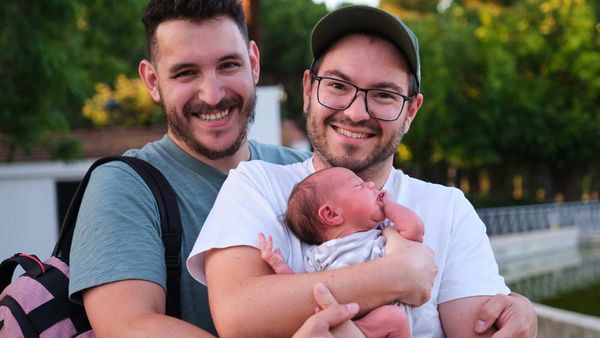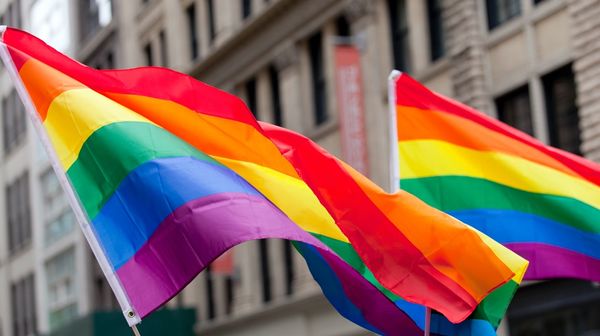January 9, 2016
In California, 2016 Brings A Slate of GLBT-Friendly Laws
Seth Hemmelgarn READ TIME: 4 MIN.
With the beginning of the new year, several California laws affecting LGBTs have gone into effect. The legislation addresses collection of data on sexual orientation and gender identity, as well as providing benefits to transgender people, among other areas.
Arguably the most consequential bill to advance last year was Assembly Bill 959, the Lesbian, Gay, Bisexual, and Transgender Disparities Reduction Act authored by Assemblyman David Chiu (D-San Francisco). It requires four state agencies to start collecting demographic data on gender identity and sexual orientation by July 1, 2018.
The bill specifically instructs the departments of health care services, public health, social services, and aging to collect the "voluntary self-identification information" pertaining to LGBT people.
"After years of being left out of statewide demographic data, LGBT individuals will now be able to share their experiences to provide much-needed data to understand and ultimately reduce long standing health disparities that have disproportionately impacted these communities," stated Chiu.
Equality California sponsored AB 959.
Rick Zbur, EQCA's executive director, has told the Bay Area Reporter that he expects to see state forms and computer systems be updated with LGBT-specific questions prior to the deadline set in the legislation.
"I think many of the agencies will do it faster," said Zbur. "From our perspective, we didn't want to give them too much time but enough time to update their forms under the normal rotation for updating forms and computer systems. This is not a hard thing for them to do."
Like the other LGBT-related laws, AB 959 took effect Friday, January 1.
One of the many other bills Governor Jerry Brown signed into law was gay Senator Mark Leno's (D-San Francisco) Senate Bill 703, which requires out-of-state companies bidding on state-funded contracts to offer their transgender employees the same benefits other employees receive. California-based companies are already required to do so.
Specifically, the bill prohibits a state agency from entering into a contract in the amount of $100,000 or more with any company that does not offer equal benefits based on an employee's gender identity.
"Denying equal benefits to employees at the same company based on gender identity is harmful and wrong," Leno stated. In a brief call this week, he added, "Our tax dollars should not benefit businesses that discriminate."
Geoff Kors, government policy director at the National Center for Lesbian Rights, a co-sponsor of the bill, noted that the legislation makes California the first state in the nation to refuse to contract with businesses and other entities that discriminate against their transgender employees in benefits.
Brown also signed Leno's SB 731, which requires the consideration of gender identity when officials place youth in the state's foster care system. Supporters argue that the policy will result in transgender foster youth being placed in appropriate homes where they feel safe and accepted.
NCLR youth policy director Shannan Wilber said in an email that the nonprofit has "received many calls from transgender foster youth who have experienced bias and mistreatment in foster and group homes, subjecting them to instability, trauma, and poor outcomes."
Another new law, AB 87, authored by Assemblyman Mark Stone (D-Monterey Bay), prohibits peremptory challenges during the jury selection process of a prospective juror based on an assumption they will be biased because of his or her gender identity, gender expression, ethnic group identification, genetic information, or disability.
"This new law will take a modest but necessary step to ensure that defendants are allowed a trial by an impartial jury that reflects a cross section of the population in a community," Stone stated.
AB 830, which Brown also signed into law, allows transgender crime victims, as well as anyone subjected to violence due to their sexual orientation, to bring a civil action for damages against the responsible party.
Lesbian Assemblywoman Susan Talamantes Eggman (D-Stockton), chair of the California Legislative LGBT Caucus, authored the legislation, which clarifies that legal remedies for the victims of violence motivated by a person's gender are also available to transgender people and others who've been targeted because of their sexual orientation or gender identity.
Some new laws are meant to protect LGBT students.
Assemblywoman Shirley Weber (D-San Diego) authored AB 329, the California Healthy Youth Act. It requires sex education for students in grades seven to 12 to provide medically accurate and age-appropriate instruction on LGBT youth and families, and the prevention of sexually transmitted infections, HIV, and pregnancy.
AB 827, authored by Assemblyman Patrick O'Donnell (D-Long Beach), calls for the creation of a training program to help teachers combat bullying and support LGBT youth who are coming out of the closet or being targeted by other students.
Among other bills that took effect last week is Chiu's AB 960, which modernizes California law to protect families using assisted reproduction methods. Under the new law, sperm donors will not be legally considered a parent and unmarried people using assisted reproduction would have the same parental rights as married parents.
AB 865, authored by Assemblyman Luis Alejo (D-Salinas), requires recipients of California Energy Commission grants or loans to increase procurement from minority-owned business enterprises, including those run by LGBT individuals.
Looking Ahead
Another bill of significant benefit to the LGBT community that passed in 2015 was AB 339, authored by gay Assemblyman Rich Gordon (D-Menlo Park). It caps the amount an individual pays out-of-pocket at $250 for a single 30-day prescription.
Backers of the bill, which will go into effect January 1, 2017, expect it will be a boon for those Californians with cancer, HIV/AIDS, and other diseases.
EQCA backed several successful bills in 2015.
In a recent interview, Zbur said "a very high priority" for EQCA this year is modernizing the "draconian" laws related to HIV transmission.
Current laws are used to "intimidate" people who are living with HIV, he said, and "they are really out of step with other kinds of transmission laws for other diseases."
According to EQCA, many people who are living with HIV "remain criminalized for their status, often facing severe sentences for engaging in any sexual act without disclosing their status, regardless of the level of risk associated with the behavior."






